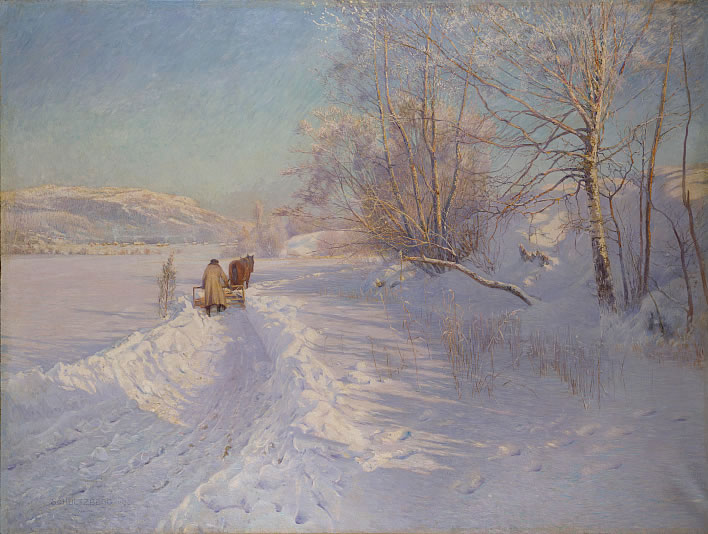Quote and image of the month 01.2020
Posted on UTC 2020-01-25 11:13
A 'be careful what you wish for' edition for the climate alarmists of the Gretaceous epoch.
Anshelm Schultzberg, A Winter Morning after a Snowfall in Dalarna (1893)

Anshelm Leonard Schultzberg, Vintermorgon efter snöfall i Dalarna / A Winter Morning after a Snowfall in Dalarna, 1893.Image: Swedish National Museum [Click to open a larger image in a new browser tab].
Dalarna is a province in central Sweden. Its capital, Falun, featured in Johann Peter Hebel's (1760-1826) classic German story Unverhofftes Wiedersehen, which was our Saint Lucy's day theme in 2017.
Siegfried Lenz, from Heimatmuseum (1978)
And then this winter: just form for yourself an image of an absolutely snowed-in land, shortened houses, shortened forests, let snow flurries be driven by the wind, throw a couple of exhausted crows into the air, give our winter everything which its bad temper demands: hard, glinting sheets of ice, that is, the singing of the frost and this rigidity in the reeds and in the glazed meadows. In the ice fishermen's boxes the perch and whitefish froze and became as brittle as glass. The clothes on the line went rigid and crackled and sometimes shattered when being taken down. The frost bit through the protective coverings of the food storage trenches and made the potatoes turn too sweet. Small birds – coal tits, long-tailed tits – dropped out of the trees, dead.
Und dann dieser Winter: denken Sie sich ein wie endgültig verschneites Land, verkürzte Häuser, verkürzte Wälder, lassen Sie Schneefahnen mit dem Wind gehen, werfen Sie ein paar erschöpfte Krähen in die Luft, geben Sie unserem Winter alles, was er in seiner Unwirschheit beansprucht: harte, blinkende Eisflächen also, das Singen des Frostes und diese Starre im Schilf und in den glasierten Weiden. In den Kästen der Eisfischer froren Barsche und Maränen und wurden brüchig wie Glas. Die Wäsche an den Leinen versteifte sich knisternd und zersplitterte mitunter beim Abnehmen. Der Frost biß sich durch die Schutzschichten der Mieten und machte die Kartoffeln übersüß. Kleine Vögel - Tannenmeisen, Pfannenstielchen - tropften tot von den Bäumen.
Siegfried Lenz, Heimatmuseum, Hoffmann und Campe Verlag, Hamburg, 1978, p. 55.
Our text relates to the region of Masuria, the 'country of 2,000 lakes', at the beginning of the 20th century part of East Prussia but now in north-eastern Poland, about 50 km inland from the Baltic Sea. The region has a complex, blood-soaked history and changed its ownership frequently, each change usually accompanied by persecution and ethnic cleansing. The political situation of modern Masuria, now integrated into Poland, has been normalised but cannot be said to have been settled.

Siegfried Lenz, photographed at a book reading in December 1969. Image:German Federal Archives, B 145 Bild-F030757-0015, photographer Lothar Schaack.
The great German writer Siegfried Lenz (1926-2014) grew up in this area. His semi-autobiographical novel Heimatmuseum is set principally in Masuria and is a masterful examination of the ideas of cultural belonging, ethnicity, the nature of folk memory and the questionable value of historical artefacts.
0 Comments UTC Loaded:
Input rules for comments: No HTML, no images. Comments can be nested to a depth of eight. Surround a long quotation with curly braces: {blockquote}. Well-formed URLs will be rendered as links automatically. Do not click on links unless you are confident that they are safe. You have been warned!